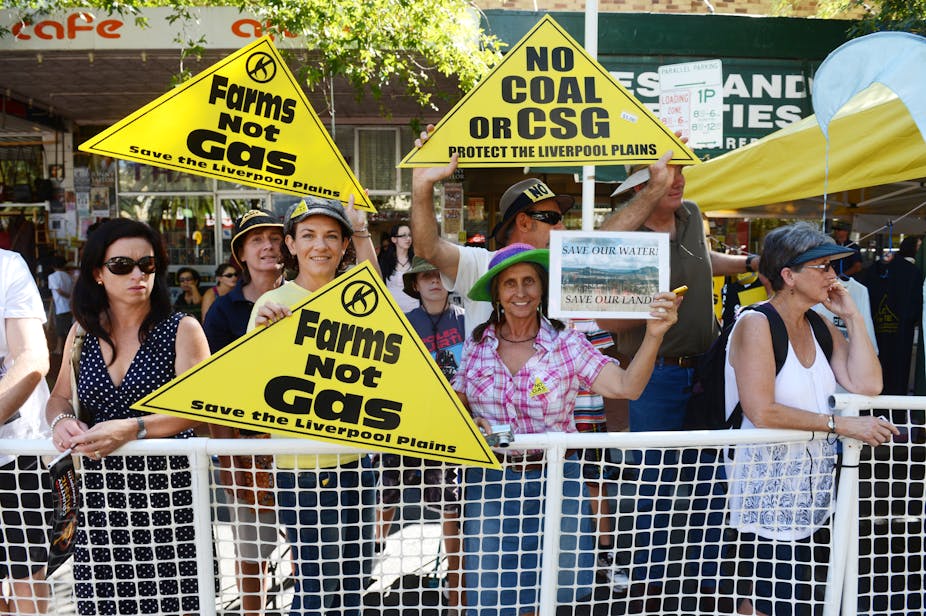Fracking is utterly transforming the global energy industry. It has opened up new energy reserves by making it economically viable to extract natural gas from coal seams and shale formations. As a result, Australia now boasts six of the world’s ten most expensive energy projects, all of which involve liquefying natural gas for export to foreign markets. The impact in the US is equally profound: it is now forecast to be nearly energy self-sufficient by 2035.
On the other hand, uncertainty around its environmental and health consequences has made fracking controversial, especially in populated areas. This has sparked a debate that is so polarised you might think the opposed groups are talking about two different things. Actually, you would be right.
Fracking is indeed two things at once. On one hand, it is a matter of national and global energy policy. On the other hand, it is a local land use issue.
From the first perspective, natural gas development is compared with coal, wind, and solar power. But from the second perspective, the relevant comparisons are to pawn shops, adult video stores, and paper mills. Fracking represents both our global interdependence on networks of commodities and our place-bound lives in communities.
This dual identity can be mapped onto different layers of governmental jurisdiction. Fracking-as-energy-policy and mineral development is a matter for state and federal government control. But fracking-as-land-use and community character is a matter for local government control. This raises the ultimate political question: who should decide?
On that question, I side squarely with Australian Lock the Gate Alliance and their principle that “communities should have the ultimate say”.
I know that local places in the developed world cannot function without the placeless energy network to sustain them. This leads some to sneer that any local restrictions on fracking are mere NIMBYism (not in my back yard). The allegation is one of hypocrisy: “You depend on the very stuff you are decrying. You will gladly consume the minerals as long as they are produced far away”.
Local groups should proudly own the NIMBY label, because I see it as a principled stand against a crass utilitarianism that would turn some places into sacrifice zones and some people into guinea pigs for the greater good. From the perspective of energy networks, it does not matter if there is a park, farm, or school on top of the hydrocarbons. But of course it does matter a great deal. It is that distortion that comes from higher levels of government abstraction that is the real danger. The view from local places is far more accurate: fracking is like Frankenstein’s monster, an unholy creature out of sync with the order of things.
The local perspective is the more human one. It is from this angle that the most important questions come into focus: what can happen in my neighbourhood and what will it do to my children, my lungs, and my water? That’s the stuff of local government and that’s why its power should trump state and federal laws.
But this is not about saying “no” to fracking as much as it is about simply having a say. It is only at the local scale of political activity that we can genuinely exercise “public freedom,” the capacity to take part in the decisions that directly affect our lives.
If a well is planned near your home or your child’s school, you ought to be involved in that decision, and local government is the only political institution that will be responsive. Take it from those in unincorporated areas living near wells governed only by the bare bones rules of state agencies concerned primarily with getting the minerals out of the ground. If you don’t live in an area with police and zoning powers, you are treated not as a person in a place but as a node on a network.
Ultimately, the case for local control of fracking is that being a citizen is more basic to our identity than being a consumer. At the local level, space opens up for citizen participation in a way that does not happen at the state and federal levels where things run according to big money. As Alexis de Tocqueville argued:
Municipal institutions constitute the strength of free nations. Town meetings are to liberty what primary schools are to science; they bring it within the people’s reach, they teach men how to use and how to enjoy it. A nation may establish a free government, but without municipal institutions it cannot have the spirit of liberty.
State and federal government are welcome to set minimum standards for how fracking must be done, but local governments should be able to raise these standards and to decide where fracking can take place. This upholds the vital good of local self-determination, so that people can exercise meaningful control over their lives. After all, there is more at stake with fracking than environmental and economic concerns. There is also the question of whether we can escape the stupor of private consumption and find purpose in crafting the public good.

